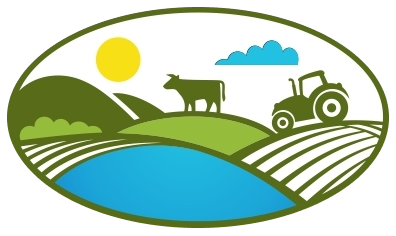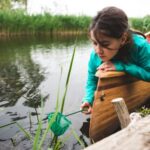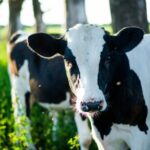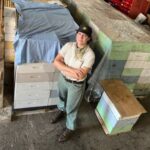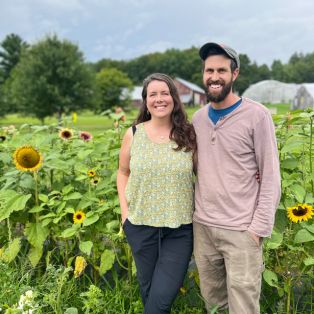
Dan and Elyse Wulfkuhle’s experience as Vermont farmers can be measured in months, but their passion for organic farming and their newfound community is boundless.
They purchased the iconic Wood’s Market Garden in Brandon in January of this year. It had been operated by the much admired Jon and Courtney Satz since 2000 until Jon’s untimely passing in 2021. When we visited the Wulfkuhles in August, it was almost like dropping in on the parents of a new baby: We found them proud, enthusiastic, a smidge tired, but none the worse for wear.
Dan and Elyse arrived here from the Olympic Peninsula in Washington. For many years, Elyse worked for the Quinault Indian Nation on water quality issues while Dan cut his teeth at other farms. Once they had children–Clara and Theo–the dream of owning a farm emerged and the search began in earnest. It took more than five years of looking high and low in both Washington and Vermont, but the Wulfkuhles eventually found their home.
“We’re happy to be a part of this awesome farming community,” says Dan.
Significant life changes are inherently challenging, but Dan and Elyse attribute the ease of transitioning to a new state and a new venture to their dozen or so employees.
“We have a pretty big crew that is really outstanding, that we can’t speak highly enough of,” Dan shares. “We’re really lucky.”
Dan and Elyse welcome all the help they can get in their complex farming operation. Wood’s Market Garden sits upon 160 acres of spring-fed land. They grow a wide variety of vegetables, berries, herbs, flowers, and hanging plants. At the time of our visit, summer crops are in full swing, with sweet corn, watermelon, peppers, eggplants, and tomatoes in abundance. Dan and his team intend to be picking all day, every day for the next two months.
They sell much of their yield through their CSA and at their farmstand, which features many other local food and garden products, as well. They also sell their vegetables wholesale to nearby restaurants and grocers, including the Middlebury and Rutland Co-ops.
Dan and Elyse grow their bountiful crops with soil health, water quality, and climate change top of mind. Although this is their first growing season at Wood’s Market Garden, they have a clear sense of what they’re doing today and in growing seasons to come.
They plan to rotate their crops regularly to ensure greater soil fertility and higher yields. Planting cover crops, such as winter rye and vetch, in the fall is on the agenda so that soil nutrients remain in place through Vermont’s snowy and wet winter. They also pay close attention to the fertilizer they apply, testing each field to determine the appropriate type and amount of nutrients needed.
If you read our Featured Farmer series regularly, you know many of our members, especially our conventional dairy farmers, engage in no-till practices. This looks a little different for the Wulfkuhles because they do not use herbicides to control their weeds.
“We’re very cognizant of our tillage, but as organic vegetable farmers, it’s a tillage-intensive type of farming,” shares Dan. “We try to reduce it as much as possible. We pick our tools and implements quite wisely.”
What does that look like?
“We’re intentional about the timing of our tillage,” Dan explains. “We’ll do it right before it’s necessary so we don’t have to do it over and over again.”
He adds, “We primarily use a disc harrow which is a shallow tillage tool that disturbs the soil less. And we avoid using a rototiller.”
On the water quality front, Dan and Elyse use drip irrigation with plasticulture, which helps retain moisture, heats up the soil, and relieves weed pressure. Because this practice does involve plastic, they try to limit it only to crops that truly need it.
In future growing seasons, Dan and Elyse are eager to build more greenhouses to extend the growing season and produce higher yields of food throughout the year. They’re particularly interested in doing more wholesale and selling to institutions, such as schools and hospitals, to make organic produce more widely available to people, irrespective of their socioeconomic status.
Overall, Dan and Elyse are proud to create a local source of food, which cuts down on greenhouse gas emissions from shipping. They strive to grow high-quality varieties adapted to our climatic region with the best flavor.
“We’re producing something humans need in a less a harmful way,” says Elyse.
Dan concurs.
“Hopefully, our little farm can be one of many examples of what you can do to push the envelope at this scale.”
